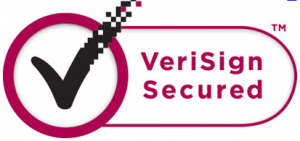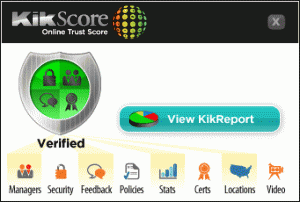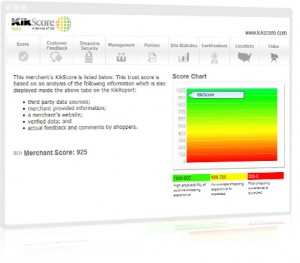Archive for the ‘Security’ Category
Learning from the Past: KikScore’s Top Twelve Blog Posts of 2011 for Small Businesses and Startups
Wednesday, December 28th, 2011
It’s been a great year for KikScore! We’ve gained partners, garnered press, interviewed tons of great startups, and released our first white paper. Sounds like a winning year to me. That’s why we put together a list of our top blog posts for 2011. By highlighting some of our beloved posts, we can reflect on what KikScore has accomplished through the year as well as go over some information that we believe is important enough to bear repeating for small business. We hope you enjoy!
#12: 5 Ways to Develop a Killer Brand for Your Small Business and Startup
If you are looking to establish a good brand name for your business, then this post is for you. Although it’s daunting to see big businesses with huge budgets for marketing and advertising, there are cheaper and more effective ways to build your brand. This post goes over the different ways in which you can deal with your customers and make their experiences so great that your brand will practically build itself.
#11: 7 Questions A Small Business or Startup Should Ask Themselves Every Day
It’s critical to ask yourself important questions. Even if it is just to make sure that you know the answer instead of just thinking you know the answer. This post discusses several questions that you need to ask to make sure that your business is headed in the right direction.
#10: The Day in Pictures & Tweets at the 2011 SmallBizSummit
Just as the title says, this post is a compilation of pictures and tweets from the 2011 SmallBizSummit. Here you can find great quotes and images that focus around how all small businesses should act and what they should do. Take a look and feel like you were there yourself.
#9: 5 Reasons that Startups & SmallBiz Must Engage Their Customers
If you think that this list is already beating up the idea of paying attention to customers, then you aren’t thinking like a business should. This next post builds upon the ways to really engage customers and see results. Give it a read and try the advice for yourself. We promise you won’t be disappointed.
#8: Web Design Contracts – Protect Yourself & Your New Business
This guest post, written by Gregg Hand, is of vital importance when preparing to set up a website. We’ve all heard the speech about why we have to read the fine print before signing a contract. However, now that you’re helping to make a contract with a web designer, you must be twice as cautious. If you’ve never had to make this type of contract, this post can help you with a set of helpful advice on what to look out for.
#7: Top Ten Reasons Small Businesses Fail Series
(Procrastination; Competition; Marketing; Clients; Employees; Versatility; Location; Cash Flow (Followup); Closed Mind; Planning)
Here is a series of posts that we’ve worked on throughout the year in an effort to help small businesses understand what they must avoid. Some say that learning from the past is one of the best ways to prevent certain future events. There’s at least some truth to this saying, so we hope that this series will help your business avoid the easily avoidable.
#6: KikScore SmallBiz Interviews’ Greatest Hits & Top Strategy Tips for Entrepreneurs (Part I and Part II)
These posts use quotes from businesses that KikScore has interviewed in the past regarding lessons they’ve learned and challenges they’ve faced. Each quote has years of experience in ingrained in it, so they’re worth the reading.
#5: Championship Sports Teams…What Do They Teach Us for the Small Business & Startup Arena
Bringing together two seemingly different dynamics, this post talks about how the NBA’s Dallas Mavericks and the NHL’s Boston Bruins’ respective teamwork reflect how teams in small businesses must act. Just as in sports teams, the members of your business must be willing to work together and take risks. Take a look and see for yourself just how true this is.
#4: 3 Tools for Boosting Your Business’ Image
This post goes over some tools that all businesses can use, so we think it is worth making the cut. Each tool is free and KikScore utilizes all of them. What are they, you ask? Well there would be no point in referring back to the article if we just said it here, so you’ll just have to look at the post for yourself.
#3: Nonprofit or Going for Broke: Ways to Demonstrate Your Business is Legitimate & Trustworthy
Rather than discussing all small businesses, this post gives advice to nonprofits. Whether for profit or not, all businesses suffer from trust issues. If you are having issues with your nonprofit or even just looking for a way to make it better, this post can help.
#2: #SmallBizChat Highlights – Tips on How to Make Your SmallBiz Website Look Trustworthy and Credible
Here we recap our great experience of being the guest of honor for #SmallBizChat on Twitter. It was a great way for us to take and answer different questions about how small businesses deal with online trust. A slideshow is included in the post, so feel free to check it out.
#1: Shoppers Trust Businesses Who Share More Information – KikScore Online Trust Survey Finds
Another important hallmark of KikScore’s year is the recent issuing of our first white paper, which is discussed in this post. It took a lot of time and a lot of research, but it came out great. If you are interested in online trust and how it impacts small business, take a look at this post and KikScore’s white paper.
We’ve had a great year all-in-all and we anticipate that 2012 will be even better! We appreciate everyone who has worked with us and taken the time to help us this year and we hope you all have a great 2012!










 at KikScore’s service seal focuses on proving to potential customers that your business can be trusted. The data that goes into creating your business’ unique service seal can say a lot, but why stop there? After all, referrals are the best way to get more business. That’s where our service seal’s feedback platform comes in handy.
at KikScore’s service seal focuses on proving to potential customers that your business can be trusted. The data that goes into creating your business’ unique service seal can say a lot, but why stop there? After all, referrals are the best way to get more business. That’s where our service seal’s feedback platform comes in handy.

